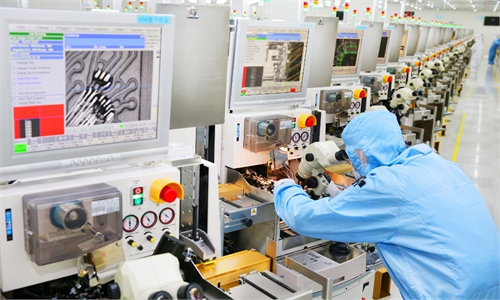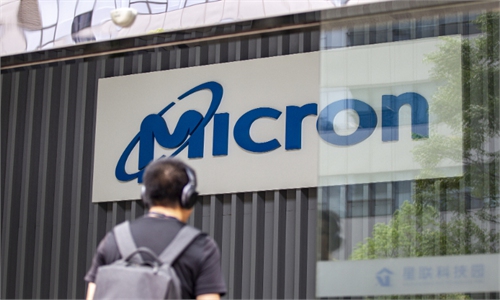
Illustration: Chen Xia/Global Times
Japan said on Friday it will restrict exports of 23 types of semiconductor manufacturing equipment, according to Reuters. While it did not specify China as the target of the restrictions, the development has been widely seen as the proof that Japan will align its policy with the US-led "decoupling" push to curb the export of key technology to China.
This is a sign that Japan will follow the US in containing China's economic development, which will apparently increase the complexity of the economic and trade cooperation between the country and its close neighbor.
Whatever the reason or excuse, Japan's attempt to extend its security alliance with the US to the economic and trade field represents a regression in terms of free trade. As a country that relies heavily on foreign trade, Japan needs to carefully weigh whether its economy can withstand the consequences of following the US' "decoupling" push from China, its largest trading partner for more than a decade.
It is true that Japan has a sizable economy and well-developed manufacturing base, but its prolonged sluggish economic performance has recently made many fears that the economy may be close to surrendering it crown as the world's third largest economy. Moreover, in 2022, Japan's current account surplus stood at 11.4 trillion yen ($88 billion), representing a sharp fall of 47 percent compared with the previous year, according to media reports.
If anything, the lackluster economic performance has constituted stark contrast with Japan's expanding geopolitical ambitions these days. If Japan continues to pick geopolitical considerations over economic interests, it will not only cause Japan to lose the opportunity of focusing on economic recovery, but will also trigger its own industrial chain chaos.
As far as the semiconductor sector is concerned, despite Japan's competitive advantages in semiconductor raw materials, it should be noted that technological development must be closely integrated with market needs. And in the case of Japan, the loss of market with a strong purchasing power means that the momentum for technological innovation will be weaker and weaker.
According to a survey conducted by the Japan Bank for International Cooperation, the overseas production ratio of Japanese manufacturing sector in fiscal year 2021 was 33.8 percent, with the overseas sales ratio at 36.3 percent. Among them, the Japanese electronics industry and auto industry are more dependent on overseas market, with overseas sales ratio about 45 percent. China is the most important market for Japanese manufacturers, which is not just because the relatively high returns on Japanese investment in China, but also due to the growing demand of Chinese customers.
The complementarities of China-Japan trade determines that if Japan cuts China off the technological supply chain in order to pander to the US, then the Japanese economy will also suffer significantly. The economic and trade relations between China and Japan are based on equality and mutual benefits, not favors China is seeking from Japan. China's development is not a pressure but an opportunity for Japan.
Now that Japan has made it clear it will join the US ban on chip exports to China, it can be seen as a hostile economic move against China that could have triggered serious repercussions for some Japanese companies that violate the rule of fair trade and WTO's principle of fair competition. If Japan sides with the US in suppressing China's development, it is delusional to think that China would not fight back. The stakes related to the entire Asian industrial chain and supply chain are so high that China must take corresponding measures to counter any behavior that may bring disruption and shocks to the regional supply chains.
Moreover, the more the Japanese government siding with the US in politicizing economic, trade and technological issues, the more dependent Japan will become on the US. Some might argue that the interests of the US and Japan could be aligned on the same page, but past experience suggests that the actual dynamics may be different. Once the US domestic policy orientation changes, Japan's interests are often the first to be sacrificed.
Currently, Asia is one of the most prosperous regions in the world, with China, ASEAN, and India all forecast to see robust recovery this year. This is supposed to be an unprecedented opportunity for China and Japan to strengthen cooperation, injecting momentum to the Japanese economy, but the precondition is that Japan needs to shake off its geopolitical shackles first before integrating into the Asian economic development.



